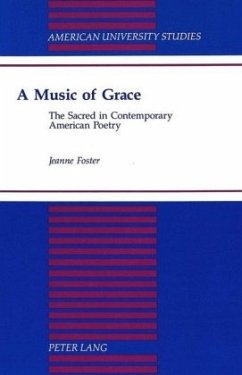In our mid-to-late twentieth century secular society, a most pressing theological question is, Where does the dimension of the sacred reside? The question is posed here through the poetic worlds of James Wright, Anne Sexton, and Galway Kinnell, each a winner of the Pulitzer Prize. In the midst of collapsing values, these poets express a longing for a lost world of meaning. The author shows how each attempts to re-vision and re-language the sacred without resort to traditional piety. Lawrence's process poetics and Whitehead's process theology shed light on the question of the sacred and the poetic response.
"Herself an accomplished poet, Jeanne Foster has written discerningly on the works of three American poets - James Wright, Anne Sexton, and Galway Kinnell - seeing them as voices no longer able to accept traditional religious language, while still affirming and groping for the sacred in a post-Holocaust world. But precisely in that context, she discloses her own poetic voice. Jeanne Foster is a poet who writes with a poetic voice on the poetry of others, illumining so many facets of human experience through the poetry of her own prose." (John Dillenberger, The Graduate Theological Union)
"'The Music of Grace' is a moving and persuasive book about the search for the sacred in post-Hiroshima, post-Holocaust America, at a time when history had given poets a searing and most terrible vision of the human heart to absorb. Drawing on the work of Whitehead, Bonhoeffer øand! Bellah, Dr. Foster thinks about the convergence of philosophy, theology, and poetics in three important Americanpoets, James Wright, Anne Sexton, and Galway Kinnell. 'Poets name the holy', Martin Heidegger said. Dr. Foster has written with compelling thoughtfulness and a poet's clarity and grace about the continuing struggle to make this so." (Robert Hass, The University of California at Berkeley)
"This lovely book by a gifted poet argues clearly for the religious significance of poetry in our time. It opens my ears to hear the speaking that comes to us fresh and wild from the mouths of poets." (Rebecca Parker, Starr King School for the Ministry)
"'The Music of Grace' is a moving and persuasive book about the search for the sacred in post-Hiroshima, post-Holocaust America, at a time when history had given poets a searing and most terrible vision of the human heart to absorb. Drawing on the work of Whitehead, Bonhoeffer øand! Bellah, Dr. Foster thinks about the convergence of philosophy, theology, and poetics in three important Americanpoets, James Wright, Anne Sexton, and Galway Kinnell. 'Poets name the holy', Martin Heidegger said. Dr. Foster has written with compelling thoughtfulness and a poet's clarity and grace about the continuing struggle to make this so." (Robert Hass, The University of California at Berkeley)
"This lovely book by a gifted poet argues clearly for the religious significance of poetry in our time. It opens my ears to hear the speaking that comes to us fresh and wild from the mouths of poets." (Rebecca Parker, Starr King School for the Ministry)

